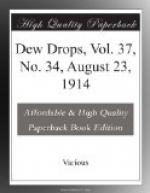There the tears ever
falling are turned into fog
That hangs
o’er the vale damp and chill,
And in it the little
folks shiver and shake
Till they
really are well-nigh ill!
So I long to cry out
to the sad little crew,
“Come up
to the sunshine, you grumpy ones, do!
Your tears are all needless,
if only you knew—
Come out
of the Valley of Grump, poor dears,
Come out of the Valley
of Grump!”
THE “BITER’S” WAGON.
By Mary E.Q. Brush.
I am sorry to say that little Chalmers Ashton was afraid of things! And you know there was really nothing to be afraid of, for he lived in a safe, comfortable house in the best part of town, and there were father and mother and grandpa and Uncle James, Tilly the maid and Billy the hired man to look after him—to say nothing of Mr. O’Brien, the burly policeman in blue coat and brass buttons, who used to stroll up and down the street after nightfall.
But Chalmers used to “imagine things”—“think them up in his mind.” I can’t begin to tell you just what they were—only some were like snakes and some had horns and sharp teeth and glaring eyes and they growled like everything.
Chalmers made up a name for them; he called them “The Biters.” Awful silly wasn’t it, to be afraid of made-up things?
One day an animal show came to the town. For one whole day big white tents were in the meadow at the rear of the orchard which belonged to Chalmers’ father, and, what with the rumbling red and yellow wagons, the noise and confusion, the shouting of the men, the roaring of the lions and howling and snarling of the other animals—well, really, it was almost like being next door to a jungle! And it was after midnight before everything was packed up and put on board the long train of cars.
Now the show people left one of their smaller wagons behind them; it was a very old one and something was the matter with it so that they didn’t think it worth while repairing. So the next morning, there it stood near the elm tree out in the meadow. Then, what do you suppose? Well, it was a very foolish thing to do, but Chalmers got it into his head that some of the animals had been left in that wagon!
“I dare say they are ‘Biters,’ and maybe, sometime if I go near them, they’ll pounce out and grab me!” the little boy said to himself, and not a day passed that he didn’t cast scared glances toward the tattered cover of the wagon. Of course there were times when he felt quite brave and actually wanted to peep into the wagon; more than once he had visions of what a delightful time he might have with it, making believe it was a street car, or playing with it as an omnibus—but he never mustered up enough courage to do this.
One day as he came home from school he happened to glance at the wagon and his heart seemed to jump up into his throat. Surely there was something stirring inside that wagon; he saw the canvas cover bulge out—no, it wasn’t the wind fluttering it! Besides he was positive that he heard queer noises inside.




